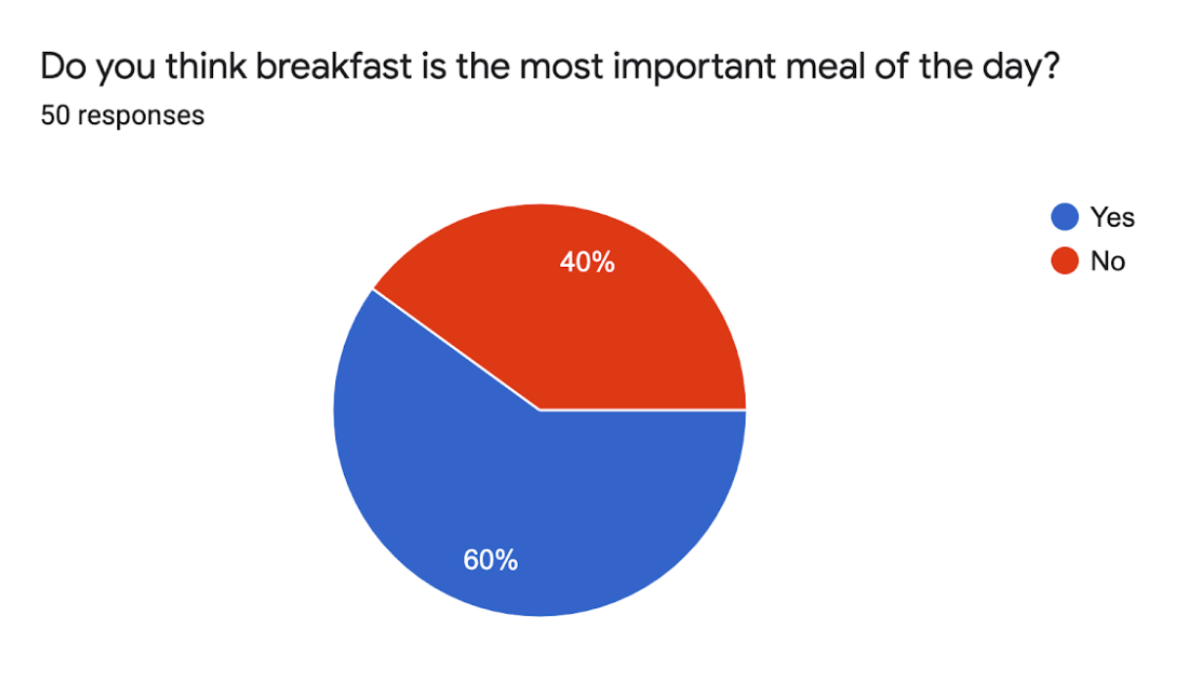It’s true what they say: breakfast is the most important meal of the day. As the name suggests, breakfast breaks the overnight fasting period. Though many WIS upper school students disagree, science proves that breakfast provides you with the energy, nutrients, and mood boosters needed to get through the day.
Skipping Breakfast
Many teenagers nationally and schoolwide do not consider breakfast the most important meal of the day. According to studies at the University of Minnesota, nationally, about 60% of high school students skip breakfast each morning.
At WIS, 40% of upper school students, according to a survey of 50, don’t think breakfast is the most important meal of the day. Some of these students think that the meal is optional; “I don’t eat breakfast and feel fine,” sophomore Eleanor Hawkins said.
Others think that breakfast doesn’t fuel your body. “It typically does not provide you with the most energy,” 8th grader Maggie Moore said.
Still, others think that other meals are more important than breakfast. “I think dinner is the most important meal because dinner is delicious,” 6th grader Sabine Crawford said.
32% of WIS upper school students eat breakfast some days because they don’t have time in the morning. “If school starts 10 min [after] breakfast, you can’t actually eat that much,” 6th grader Dani Peto-Benedek said.
Six percent of students don’t eat breakfast for other reasons. “I sometimes am just not hungry,” 6th grader Duncan Palmer said. “I forget about it,” 6th grader Sarah Murphy said.
Energy
When I wake up, I feel I could use another eight hours of sleep. Somehow, I eventually pull myself out of bed, with the sole motivation of knowing I’m soon going to indulge in my favorite meal. When I reach the kitchen I feel faint and weak like I may faceplant onto my granite countertop. Luckily, I have the mango and banana smoothie I prepared last night waiting for me in my fridge. As I consume the drink, I feel my energy rise and by the time there is no more liquid for my straw to slurp, I have enough fuel to keep my body functioning until lunchtime.
The body’s energy source is glucose, which comes from the carbohydrates it consumes. The body stores most of its energy as fat but it also stores glucose as glycogen in your liver and in your muscles. During times of fasting, like overnight, your liver breaks down glycogen and releases it into your bloodstream as glucose. This is especially important for your brain as it relies on glucose for most of its energy.
In the morning, when most people have fasted for up to 12 hours, glycogen levels are low.
According to the Victoria State Government’s Better Health, once all of the energy from your glycogen stores is used up, your body starts to break down fatty acids to produce the energy it needs. Without carbohydrates, fatty acids are only partially oxidized, which can reduce your energy levels. Breakfast replenishes the stores of energy and nutrients in your body.
Essential Vitamins, Minerals, and Nutrients
Breakfast provides a lot of your recommended daily nutrient intake. Breakfast foods are rich in key nutrients like folate, calcium, iron, B vitamins, and fiber.
People who do not have breakfast may not meet their recommended daily intake of vitamins, minerals, and fiber.
Brain Power
If you skip breakfast, you are prone to feel sluggish. I’ve felt these effects many times when I’ve waited to eat until lunch. My vision became blurry and I felt dizzy because my brain hadn’t received the energy it needed. Once I arrived at my first period class, I had a hard time focusing because my stomach kept grumbling. It was telling me to eat. I should’ve listened.
According to Better Health, not having breakfast affects your mental performance, including memory, ability to concentrate and your attention. This tends to make regular tasks feel harder than they normally would.
Children and teenagers who regularly eat breakfast tend to perform better academically compared with those who don’t. They also feel a greater level of connectedness with teachers and other adults at their school.
Healthy Weight
There is a misconception that not eating breakfast can help you lose weight. This is not true. If you skip breakfast, you might be able to suppress your hunger until lunch but at some point during the day, your body will want the calories and nutrients that you neglected in the morning. As a result, you may binge on unhealthy foods to satisfy your cravings.
When I skip breakfast, I yearn for more processed and unhealthy snacks like chocolate or Doritos. I tell myself “just one more chip” but shortly reach the crumbs at the bottom of the bag. However, when I eat the meal I rarely eat snacks throughout the day. If I do, I tend to go for more healthy snacks like popcorn, nuts, or fruit.
According to Better Health, people who eat breakfast daily tend to be a healthier weight and have a healthier body mass index than those who do not. Also, people who eat breakfast every day are less likely to be overweight or obese. This is because eating breakfast prevents large fluctuations in your blood glucose levels, keeping your energy up and helping you control your appetite. It also fills you up before you become super hungry, so you’re less likely to grab whatever foods are nearby when hunger really strikes.
Better Food Choices
Since I’ve started eating a balanced breakfast daily, I have felt a change in my overall health. I’ve started eating healthier, organic food and I have better control over my appetite. I have also felt more energized and happy.
People who eat breakfast regularly make better food choices than people who don’t; they have healthier diets overall and have better eating habits.
Children and teenagers who don’t eat breakfast or eat an inadequate breakfast are more likely to make poor food choices not only for the rest of the day but for the rest of their lives.
Reduced Risk of Illness
According to Better Health, people who regularly eat breakfast tend to have a lower risk of obesity and type 2 diabetes than those who don’t. People who don’t have breakfast may be at a higher risk of cardiovascular disease.
The Best Meal of the Day
Breakfast isn’t only food to make your body function but it’s also food for the soul. Personally, I get really excited planning my breakfast for the next day, and when I skip breakfast I get really hangry.
The crunch of granola against the tanginess of yogurt, the fluffiness of the pancakes, the crisp bread spread with creamy avocado topped with an oozing egg and Trader Joe’s “Everything But The Bagel” seasoning…those are just a few of my breakfast favorites.
Ultimately, breakfast is not only the most important meal of the day but also the best meal of the day.
By Zoe Hällström
a self-proclaimed oatmeal enthusiast


































































